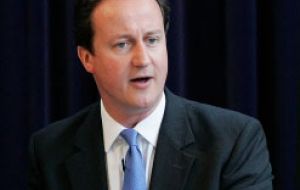MercoPress. South Atlantic News Agency
Lisbon Treaty controversy looms over the Conservative party conference
 David Cameron, prefers to “Get Britain working”
David Cameron, prefers to “Get Britain working” Britain’s Tory leader David Cameron is fighting to prevent a damaging new rift over Europe dominating his party's final conference before the general election.
As activists gathered in Manchester, he rejected calls by Tory Euro-sceptics for a commitment to press ahead with his promised referendum on the Lisbon Treaty even if it had been implemented by the time his party had won power.
Mr Cameron instead sought to focus attention on his £600 million pound “Get Britain Working” plan to scrap Labour's New Deal programme and replace it with a simplified scheme to get the unemployed back into work.
However, following the Republic of Ireland's Yes vote in the country's second referendum on the treaty, he found himself coming under intense pressure to explain what he would do if the treaty had been fully ratified by the time of the election.
Mr Cameron - who is only committed to holding a referendum as long as the treaty is not yet fully in force - insisted he was not prepared to speculate as long as the two remaining member states, the Czech Republic and Poland, had yet to complete the ratification process.
“I don't want to say anything or do anything now that would undermine or prejudice what is happening in other countries where they are still debating whether to ratify this treaty. That is a very sensible thing to do,” he said. “There were three countries that it hadn't been ratified in - Ireland, the Czech Republic and Poland. There are now two so I don't see any reason to change our approach because one of those has decided to ratify. I think people will understand this argument that while there are other countries actually delaying the implementation of this treaty, don't do anything or say anything that stops them from doing that.”
The Conservative leader was clearly anxious not to commit to a course of action which could place a new Tory government on a collision course with Europe, while at the same time avoiding a clash with the Euro-sceptics in his own ranks.
Tory Euro-sceptics insisted that having promised the people a vote, he must go ahead regardless. Backbencher Richard Shepherd said: “We were committed to it and I believe that this is a matter of the deepest trust with the British people that we will honour that which we gave the commitment for.”
However former European commissioner and Conservative cabinet minister, Lord Brittan of Spennithorne, said that it would be “ludicrous” to try to unpick a treaty that had already been implemented. “I can't believe that a Conservative Party would, in government, want to have a referendum if the treaty is in force. I am sure wiser counsels will prevail,” he said. “To have a referendum asking Europe to unravel what is already in force would be not just politically unwise but ludicrous and impossible.”
Opponents were quick to capitalise on Mr Cameron's dilemma, with Labour accusing him of “dithering” while the UK Independence Party claiming he lacked the “backbone” to go ahead with a referendum.




Top Comments
Disclaimer & comment rulesCommenting for this story is now closed.
If you have a Facebook account, become a fan and comment on our Facebook Page!